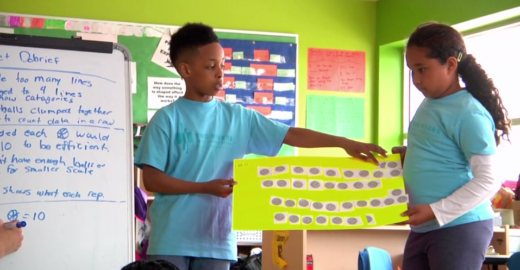Many educators are aware of Carol Dweck's research on growth mindset. The Stanford psychologist has found that the way students think about and approach challenge makes a big impact on their learning. Students who believe that they were born with a certain amount of intelligence that cannot be changed -- a condition Dweck calls a fixed mindset -- are often afraid to seek out challenging tasks and are resigned to one's perceived set of abilities. Students who see intelligence as something that can grow and change with effort -- known as a growth mindset -- tend to persist at difficult tasks, trying new strategies and ultimately performing better in school. Many schools have begun to focus on building growth mindsets in students because of this research.
Helping students develop growth mindsets is made even trickier because mindsets about learning can change depending on context. And unfortunately math class is a time when many students have preconceived notions about their abilities. Many adults, including teachers, grew up receiving negative messages about their math ability and can unintentionally pass on unhelpful messages to students through casual words or actions.
That's why it's impressive that educators at Two Rivers Charter School in Washington, D.C. recognized a culture of math fear among the staff and worked hard to change teachers' relationships to math as part of their broader strategy to improve math achievement. The school's Director of Curriculum and Instruction, Jeff Heyck-Williams, described their efforts in an Education Week article:
In August of 2010, we started by listening deeply to our teachers' math stories. We recognized that if we didn't start with their learning first, we would never be able to approach the kinds of mindset shifts necessary to impact the learning of students. Teachers—even the art teacher and the pre-school teacher—wrote their math stories, sharing their deepest feelings about math and the people and experiences that led them to those beliefs. Over 65% of the stories that teachers told were negative. When they were students, our teachers had been given messages like "girls aren't good at math," "it is OK if you don't get this, you won't need it once you get out of school anyway," and "math is either something you get, or you don't get." These messages were pervasive and came from teachers with an affinity towards math as well as teachers who couldn't stand math. By acknowledging these messages, we brought them to the surface and made teachers aware of the messages that they were explicitly and too often implicitly sending to kids about math.
By starting with the mindsets of teachers, and recognizing that each person has her own mathematical history, Two Rivers was able to empower teachers to deepen their math skills. This professional development in turn helped teachers feel capable of teaching in problem-based ways that stretch student thinking.


